Disclosure: Meeple Mountain received a free copy of this product in exchange for an honest, unbiased review. This review is not intended to be an endorsement.
“Life finds its purpose and fulfilment in the expansion of happiness.” Maharishi Mahesh Yogi.
Last week I married a lovely woman called Martha. We raised two children, Mike and Timmy, employed a housekeeper, visited Petra, planted a whole grove of trees and eventually died in each other’s arms at the age of 70.
Was I happy over the course of my life?
Absolutely. I lived a very full and very happy life.
Was the real me who was playing The Pursuit of Happiness with the Community and Experiences expansions happy over the course of an hour and a half?
Yes… Mostly. Let’s talk about the Community and Experiences expansions.
The Pursuit of Happiness was originally published in 2015 and is effectively a smarter and more creative take on The Game of Life. Check out my review of The Pursuit of Happiness if you aren’t familiar with the base game – long story short I think it’s a great game that blends its theme and mechanics well but it’s not without its quirks. The Community and Experiences expansions were funded via Kickstarter in 2017 and 2019 respectively, with both expansions providing new mechanics for players to get their teeth into and boosting the base games various cards stacks for added variability.
So what’s new and are they worth investing in?
Community Spirit
“No man is an island entire of itself; every man is a piece of the continent, a part of the main” John Donne.
The Community expansion is all about how your character engages with those around them. Whilst it adds a handful of cards to every deck in the game and components for a fifth player, the focus of the expansion is almost exclusively the Community cards and Popularity mechanism. The new Community board is placed below the central board and consists of five card spaces and a Popularity track.

Players first Engage with a Community card during a game round (paying a cost for a reward) and then at the end of the round select one of three possible Outcomes of that interaction. You might choose to ‘Help a Friend Move’ and then at the end of the round decide whether you want to ‘Carry the Couch’, ‘Pay for the Movers’ or ‘Gather a Group to Help’, with each Outcome having specific costs and benefits.
Many of the rewards involve Popularity, moving your marker up the new Popularity track. The further up the track you are the more points you get at the end of each round and the more Community cards you’re able to interact with. It’s a lovely feedback loop: Engage a Community card to become popular enabling you to Engage with more Community cards and so on.
People are fickle though so at the end of every round your Popularity decreases by one, meaning you have to keep engaging with the Community cards to see any real return. It’s a deliciously cynical rule for a game overflowing with sunny optimism.

So how does Community feel to play with?
As someone who felt that the sheer number of cards and resource cost/reward conversions on display in the base game could be a little overwhelming, you might imagine that an additional row of cards wouldn’t impress me. And on reading the rules for Community I wasn’t optimistic.
Well colour me surprised.
Community is a neat, self-contained expansion that adds a surprising amount of depth, providing interesting decisions and narrative across each of the game’s rounds.
The new Community cards provide instant and delayed gratification, all within the same round and without the need to spend multiple hourglasses to engage with a single card. The various costs and rewards tickle your brain with what you’ll need and what you might get within the current round, at the end of the round and during the next round’s upkeep costs. Sure, it’s another set of costs to pay at the end of a round, but the rewards from ‘Aunt May Visiting’ could then cover the upkeep costs of your Library leaving you free to do more in the current round.

Whilst Community does add to the visual information blizzard, the limitations on how you can interact with the Community cards helps to mediate this. You’ll always be able to engage with at least one Community card, thanks to the new Community Token (meeple) that each player gets specifically for the new cards. Knowing this takes the pressure off slightly, acting like a bonus turn every round rather than constricting your decisions. This lets you adjust to the additional row of cards and begin to take advantage of the new mechanisms at your own pace.
Thematically Community hits home too, injecting a shot of vitality and interaction. The Community cards all feel very local, from dealing with noisy neighbours to finding money and deciding whether to keep it, take it to the police or give it to charity. Many of the cards can be Engaged with by multiple players at a time, meaning that you may end up going to the same BBQ as your opponents or joining the neighbourhood watch together. These design choices combine to create an atmosphere of togetherness, as if all your characters really are neighbours living in a world that extends around them. It’s rather clever.
Experience Life
“The purpose of life is to live it, to taste experience to the utmost, to reach out eagerly and without fear for newer and richer experience.” Eleanor Roosevelt.
The Experiences expansion is more modular and includes the titular Experiences, a Dream board, Kids and Services. I’ll tackle them in order of complexity.
Service cards are people such as Housekeepers, Butlers and Bodyguards that are simply shuffled into the main Item-Activity deck and are treated like Items with upkeep costs. They add a small sprinkling of theme and frequently provide a means of bringing your Stress down but that’s about it.
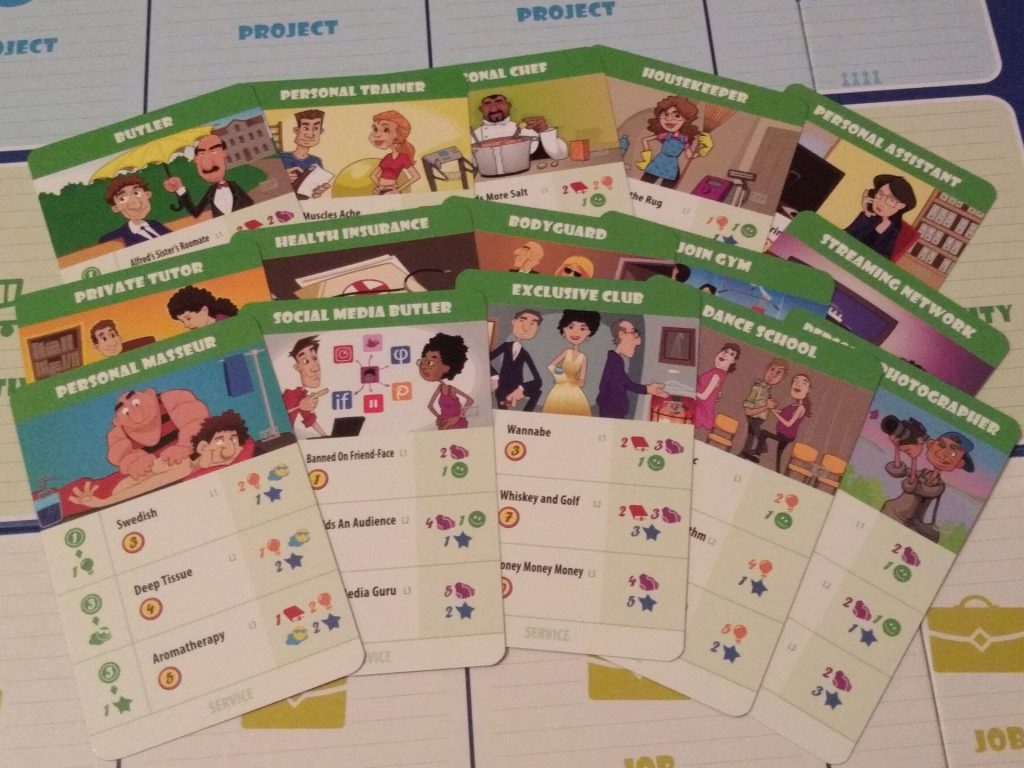
I’d have liked to see a few of them provide an additional hourglass – if you’re paying for a Personal Assistant, surely that frees up some of your time? Also, whilst the rules don’t intend it, the phrase “these cards function exactly like Items” is also a little problematic – are those in service roles simply commodities to be bought rather than people with their own dreams of happiness? I’m reading too much into it but it’s another welcome undercurrent of satire.
The Experiences expansion lets you gain a Kid when you develop a relationship to the ‘Raise Family’ level (and you can have more Kids if you choose by taking a card action). At the start of every round your kid gets older and needs supporting. If you don’t pay their upkeep costs then they still age but you’ll lose Long-Term Happiness. And those upkeep costs can be pretty steep, especially the final stage that may require you to discard a Job, Project or Item (happily you’ll have a couple of rounds to prepare for this).
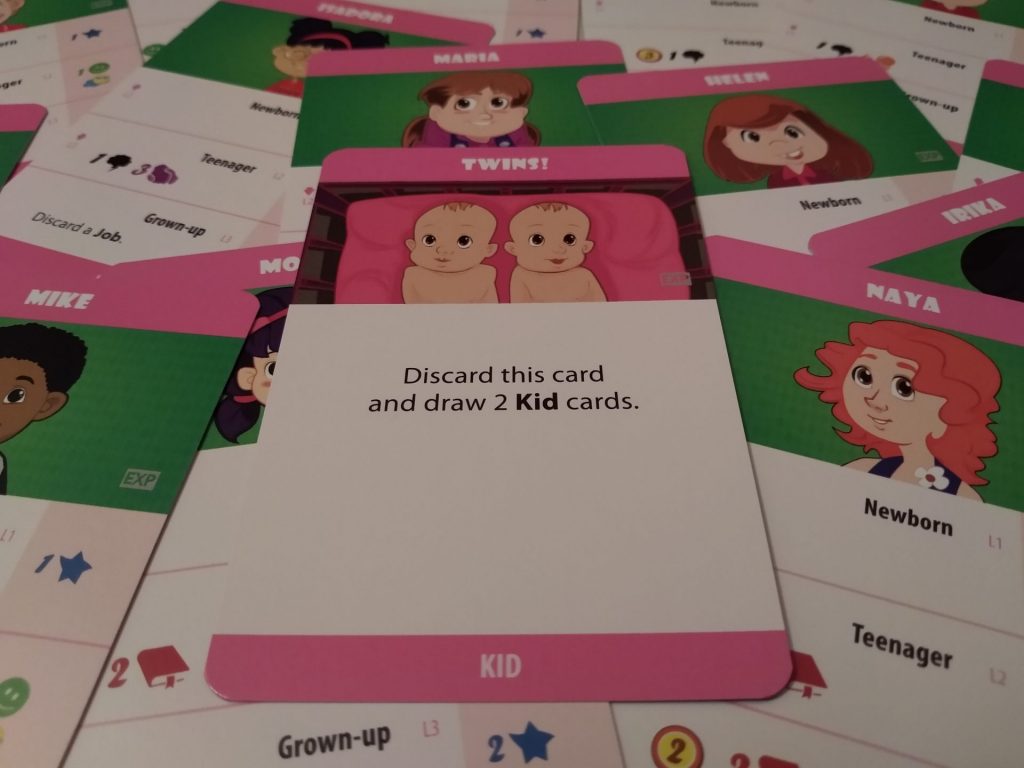
Kids are absolutely the strongest module of Experiences. A simple mechanic and a perfect thematic inclusion that makes developing a relationship to the final level satisfyingly interesting. They’re such a good addition that I’m almost angry they weren’t included in the base game. I will always include Kids from now on, even with new players.
There are plenty of times in The Pursuit of Happiness when the perfect card comes along but you simply aren’t able to take it. Step forward the new Dream action, a way of reserving cards for future use. On your turn you’ll spend an hourglass or the new Cloud token to ‘Dream’ – take a card from display and place it on your Dream board. Later you can simply take the corresponding action and turn that dream into reality, getting a few additional Long-Term Happiness points for living your dream. Be warned though, fail to achieve your dreams and you’ll lose points.
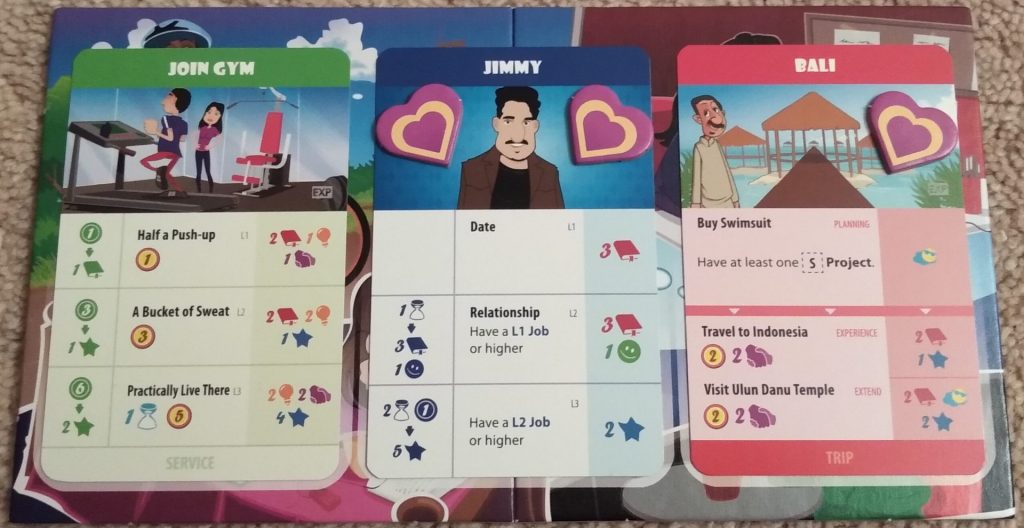
Dreaming is a perfectly fine addition to the game but not as influential or exciting as you might imagine. The main issue is that there are often so many cards on display (and it’s cheap to refresh a card row) that missing out on a particular card isn’t a problem – you’ve always got other viable options. Whilst it can sometimes add tension to the final couple of rounds to ensure you don’t lose points, Dreaming takes a precious turn and the rewards and risks never feel all that big or interesting – I’ve rarely seen anyone use the action more than a couple of times a game.
Experiences are the vast bulk of the expansion’s components – 50 Experience cards and an Experience board that sits just above the main board. First, you have to Plan your Experience by meeting its requirements (having a certain number of resources or cards in front of you). Later on you can live your Experience, paying resources for rewards and even upgrading it if you want. You might Plan to visit Liberty Island and ‘Learn about Manhattan’ and then later you could pay to ‘Travel to New York, USA’ and even ‘Book a Helicopter Tour’ if you feel extravagant.
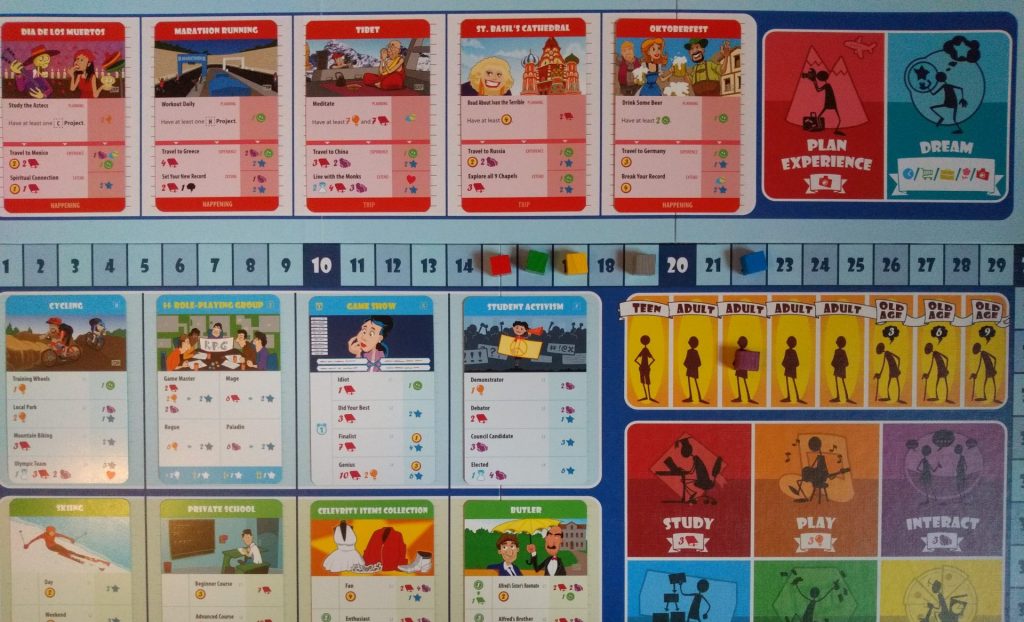
The Experiences are another row of fun cards, more decisions for you to ponder and a large dollop of theme. That being said, I’m not sure they’re as interesting as they want you to believe. They don’t interact with any other areas of the game and don’t have anything like the feedback loop or Popularity track of the Community expansion. There’s no limit on the number you can have, their initial requirements aren’t too onerous and there are generally enough on display that you can claim at least one a round. Mechanistically they’re just more cards you can take that work a bit differently and the interesting decisions they add only just outweigh the increase in fiddliness, game time and visual overload.
Thematically the Experience cards are exciting but it’s on a superficial level. In my musings on Suburbia I compared the depth and humanity of Suburbia’s theme to the forced wackiness and skin-deep style of its younger sibling Castles of Mad King Ludwig. For me it’s much the same here. The Community cards build a sense of neighbourhood and togetherness, they create something more between the players than what’s simply on the cards. In contrast, the Experience cards feel as disconnected and distant from the lives of your characters as the places they depict.
I’m lucky enough to have travelled a bit over the years and I know how much I’ve had to scrimp and save to do that. As a result the trips have felt monumental and my memories of them precious. The Experiences here don’t feel like trips of a lifetime. They’re too common in the game and too easy to obtain that they lose their impact, ending up slightly forgettable.
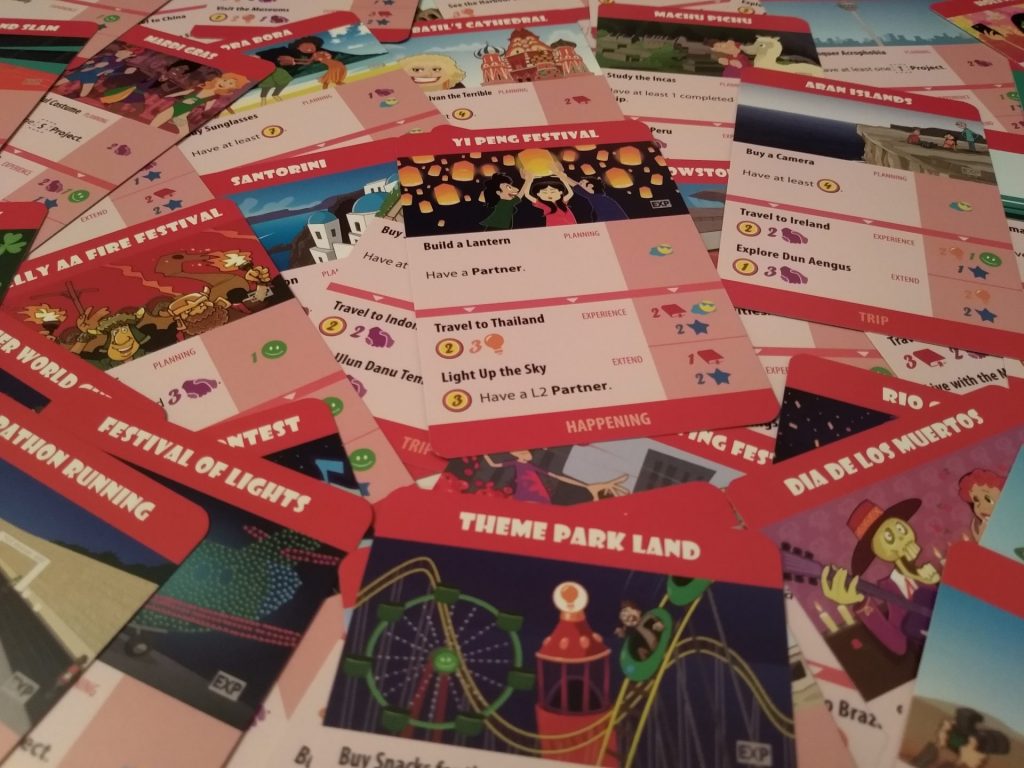
There are a few small production issues with Experiences too. The blue of the Cloud token is considerably darker than the colour of the base game and Community tokens. The pale red of the Experience card reward section makes it incredibly difficult to read the amount of yellow Creativity you’re being rewarded with. And bizarrely, Experiences doesn’t include components for the fifth player that was introduced in the Community expansion (even though it followed the release of Community).
For me, Experiences is a perfectly ok expansion but having added the Kids and Services to the base game box it’s not one that I’m going to reach for all that often. Eleanor Roosevelt talked about reaching for “newer and richer” experiences and I think that the Experiences themselves fall short on the richer part.
Common Threads
“One should not focus on the differences between people but look for commonality and similarity.” Theodore Levitt.
Whilst each expansion has its pros and cons, there are some common threads that run between them. The additional cards added by each to the various decks aren’t game changing but they provide some nice variability. The Life Goals, Child Traits and Partners largely focus on their own expansions but the rest can be mixed into the base decks without any significant rule changes, even the Services. The addition of nine Job cards in the Community expansion is especially welcome as they expand the base game deck by half again.
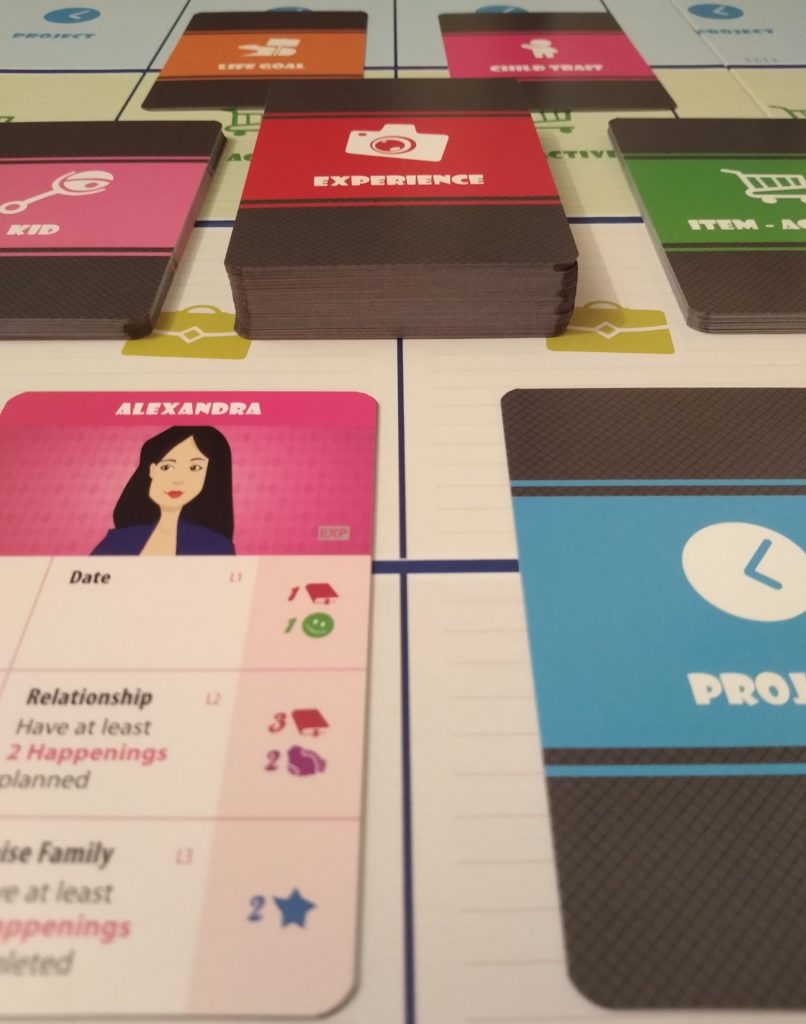
In terms of rules overhead, neither expansion adds anything complicated and if you know how to play the base game then they slot in smoothly. There’s an interesting point about semiotics, the language of design and a game’s subsequent accessibility as a result of design choices to be made by someone a lot smarter than I. The new types of cards work in subtly different ways and the distinctions between them are important. Yet thanks to consistent design choices and how symbols and signposts on the cards fit together the new cards are remarkably intuitive and make adding either or both expansions a straight-forward process for those who have already learned the language of the base game. I can probably introduce each expansion in a minute and be satisfied that the other players then know what they’re doing.
I do have some concern about balance when it comes to the Good Health (heart) mechanic. Whilst completing a card with a heart is just as rewarding as focusing on other areas of the base game, it doesn’t always feel that way when another player gets an additional hourglass (turn) per round and an additional round at the end of the game thanks to their heart. This sense of unfairness is heightened with the expansions when during that additional round your opponent also gets to use their Community and/or Dream tokens – essentially getting another two turns, invaluable in the final stages of the game. The inclusion of three hearts amongst the twelve new Project cards and the ability to reserve (Dream) heart cards if not able to claim them immediately means that players are more likely to get a heart if they want one but nothing in either expansion satisfactorily balances this issue.
All Together
“The whole is more than the sum of its parts.” Aristotle.
Both expansions add to the game length and increase the visual overload of what is already a busy board. Combined they’re too much for my tastes, the game becomes too long and the various cards and cost/reward conversions blur into a meaningless wall of information that makes it hard for me to take anything in.
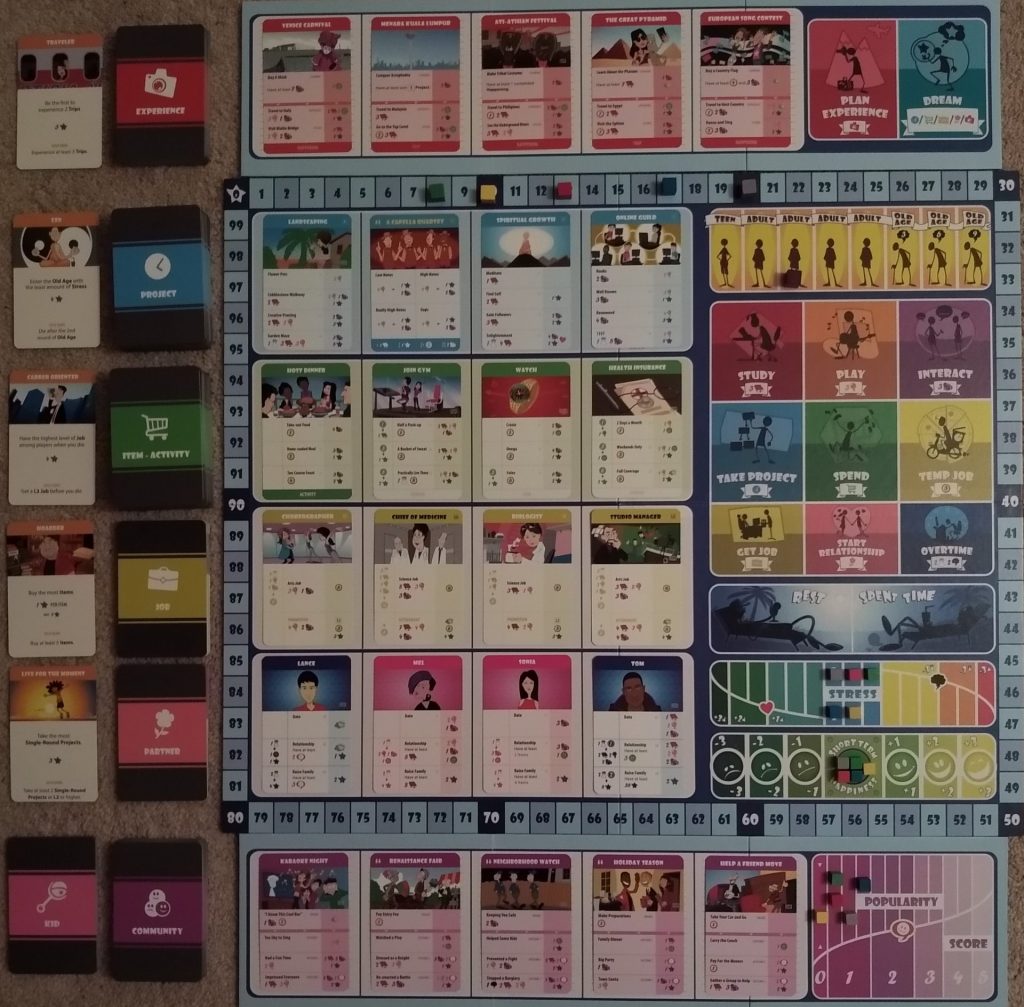
Curiously, I’ve enjoyed the solo game more with both expansions – it’s easier to stand up to look closely at cards across the board and there’s no silent pressure from other players waiting for their turn. The solo game also gives you three specific goals to aim for (in addition to achieving a set score) which helps narrow your focus when faced with the plethora of options.
Final Summary
“The examined life is the only life worth living.” Socrates.
So, are the Community and Experiences expansions worth investing in?
The cliché that no game or expansion is necessary stands true here but if you’re a fan of The Pursuit of Happiness then they’re absolutely worth considering, although I’m not completely convinced about needing both unless you play a lot.
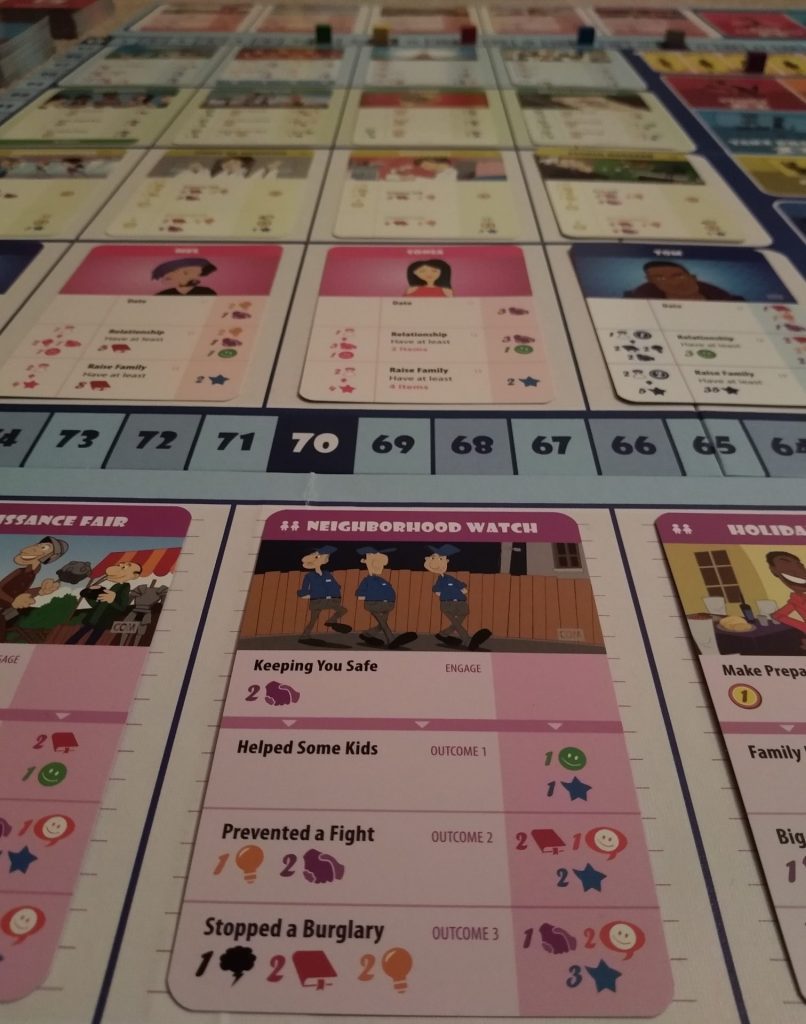
The Kids module is as essential as an expansion can get (and if that’s all you want then more Kids can be found in the KS3 Promos Set instead of forking out for a big expansion). The Community cards are a surprisingly interesting and rewarding addition, catching me off guard with how they improve the world-building and gameplay. Whilst I’m less of a fan of the Experience cards, I suspect they mainly suffer in comparison to the Community cards – they aren’t bad, they just aren’t as good.
Crucially, if theme is your jam and you want your characters to live fuller lives then the new Community and Experience cards absolutely do that and the stories you tell are undeniably more eventful. Since my main praise for The Pursuit of Happiness is about how effectively it uses its theme, I guess that makes both expansions a success.


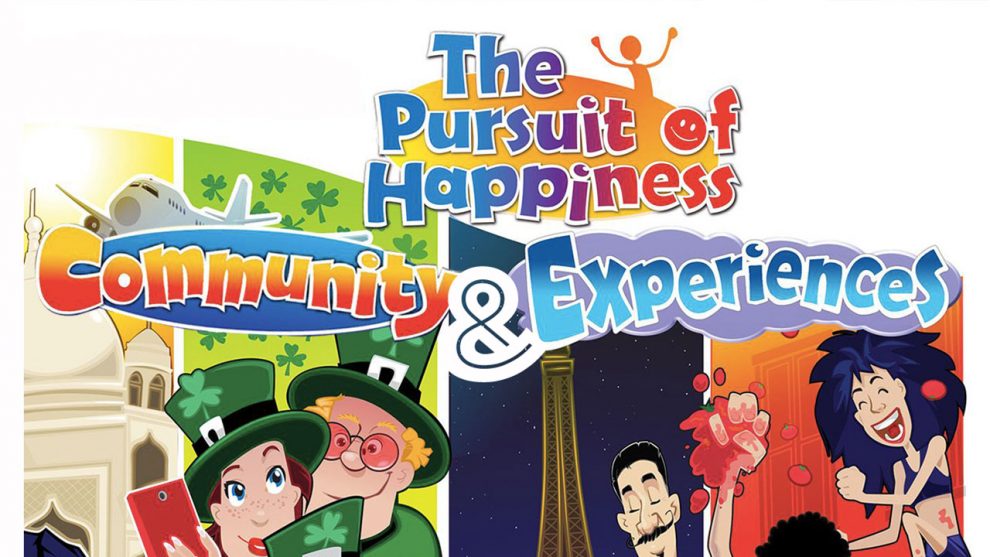









While in a sociology class, I was presented with a game with cards ands charts that had life events and such in them. Each player, each round would receive a certain number of events and such read these out to the group, and then rate how happy they are with their life on a 1-10 scale. After several rounds, players would sum up their scores, and the person who had lead the happiest life would win. Obviously, this is not something you could publish as a serious game, given than a player needs only to assign themselves 10 points every round. But it was a fun exercise as you tended to have great conversations as you discussed how the events presented would cause you to act, react, feel, and so on.
The base game here seems like a well constructed version of that conversational game I played so many, many years ago. The expansion seems interesting as well.
Thanks for a wonderful review.
Hi Kenneth, Thanks for the kind words. That sociology class game sounds fascinating (I wish we’d done things like that!) and I can imagine it would have generated a lot of discussion and reflection. Were the events a mixture of positive and negative things? The crucial difference I imagine is that in life (and by the sounds of it in the class game you played) there’s randomness – random positive and negative things can happen to you and often its about how you react to them. This doesn’t happen in The Pursuit of Happiness, which is great from a gameplay perspective and maintains the relentlessly positive vibe of the whole game (nobody wants their carefully planned strategy ruined by a tragic random event) but I have sometimes wondered if an events deck or some similar mechanic might help to enhance the theme. The first KS Promo Pack actually has just that – an events deck with positive and negative events that are revealed with enough warning for the players to be able to plan to take advantage of or prevent. One day I hope to give it a go…!